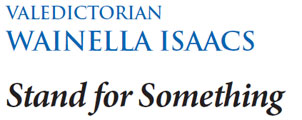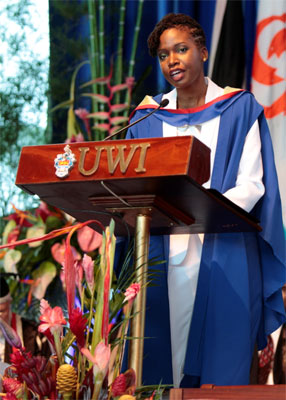 |
 |
 |
|
December 2013
|
Let me take an immediate time out to thank you, the members of staff of The University of the West Indies, St Augustine Campus, for bestowing on me the honour of speaking as the Valedictorian for the first cohort of graduands from the Faculties of Science and Technology and Food and Agriculture. I am truly humbled. peaking on the question of poverty, an issue over which he dedicated a significant part of his life, Nobel Laureate of Economics and the first Vice-Chancellor of The UWI, the venerable Sir Arthur Lewis made the profound observation that “The fundamental cure for poverty is not money but education.” Little wonder therefore about the preoccupation of our regional governments on effecting reversals to poverty, and the lack of opportunity and hopelessness which follow in its wake, even as they focus on the nexus between hope and education. Perhaps Buju Banton’s “Untold Stories” describes it best where he identifies “opportunity as a scarce commodity.” Indisputably, the youth of our region bear the brunt of this poverty, this scarcity of the commodity called opportunity. And there is an almost universal acceptance of the role of education in alleviating this undesirable and unwholesome state. The UWI, as the premier educational institute in the region, has faithfully served as a beacon of hope for many of these young people, through spearheading the initiative of fulfilling the goal of developing/enhancing the human resource base/capability of our region. His Excellency the Honourable Errol Barrow, the first Prime Minister of Barbados, at his nation’s independence recognized and emphasized that our human resources are our greatest asset. So for many of us here today: graduands and well-wishers, it is not only a privilege but also a dream come true to attend this university and successfully complete a university degree. At this time we must also remember those we have lost along this journey. These persons will not be forgotten and their memories serve as a reminder to us, that those of us here today are truly blessed and should not take life for granted. This is a moment to celebrate the diversity—geographic, ethnic, religious, cultural, economic class—of the students in both of these faculties, with a clear recognition that through the interplay of these diversities, the richness of the mosaic which we all have come to represent here and in the future, will forever shape what we produce and celebrate. To those students who not only remained steadfast in their commitment to their respective areas of study, but who also devoted time to advocacy, sport, volunteerism, learning a foreign language, different clubs and associations and all other extracurricular activities, your efforts should be lauded, for all these activities are an important part of the formula to becoming engaged, successful persons destined to accomplish great things. Special congratulations are also extended to our fellow Haitian students who have overcome significant challenges to get to this point today. As we celebrate this moment, we also recognize that this victory is not our own, but is also credited to the support of our families: biological and adopted, friends, inspiring lecturers, other members of staff and others who, through acts of kindness, have all helped us get here today. “Intelligence is not enough, it is intelligence and character that are the true measure of education.” These words were once observed by Dr Martin Luther King Jr and perhaps Malala Yousafzai, the winner of the European Union’s Sakharov Prize, epitomizes Dr King’s proposition. Through her stance for the rights of all girls to have access to an education in Pakistan, she has gained international support and added momentum to the fight for making this dream of universal education not only a reality in Pakistan, but around the world. CLR James, in his work “The Black Jacobins,” identifies yet another ingredient, that is, to take a stand. He identifies “the cowardice of the moderates who recognize atrocities, are in a position to act and choose not to act, as worse than the act of persons who commit these atrocities.” In a real sense therefore, being informed on a matter is not enough. It is what you do with this information that will be the measure of the value of your education. During and after leaving university, “What can I do with what I’ve learnt?” is one question many of us ask ourselves. I have gained all this information, but how do I now put it into practice and fulfill my conscious or subconscious dreams of making a difference.
For instance, Dr JR Deep Ford, FAO Sub-regional Coordinator for the Caribbean, during the recently concluded Caribbean Week of Agriculture hosted in my home, Guyana, stated the undeniable fact that “Agriculture is the growth pillar of the future.” The transition, transformation and revitalization of our agrarian economies will be dependent on innovation through science and technology and the subsequent technology transfer through extension services to effect needed outcomes/change. Effecting desired change, will require that many if not all issues, are addressed not only scientifically, but also sociologically and economically. Professor John Agard, constantly expressed his wish for many of us to become “informed natural scientists,” but also to consider a career in politics, for we are most suited to assist in tackling many of the issues our social scientists endeavour to solve, sometimes on their own. The linkage between these disciplines demonstrates and emphasizes the fact that only an interdisciplinary approach will be successful. We were told when we entered The UWI that we are here to read for our degrees. Former Dean of the Faculty of Science and Agriculture, Professor Dyer Narinesingh reiterated the importance of reading at every opportunity he got. Developing the habit of critical reading during our UWI experience, serves as the perfect training régime for the tasks that lie ahead. Thus, we all have the responsibility to continue to read and research and understand how all of our respective areas of study or interest are inextricably linked to determine solutions to local, regional and global challenges. With respect to many of our uncertainties of the ultimate changes we wish to effect, or not wanting to be stuck in a career/job for which we are not passionate, I urge you to resolve to act on logic while simultaneously searching for passion. Note however, lack of passion is no excuse for inaction! Seek out innovative ways to share what you have learnt. Be willing to try different things. Network with others for further personal and professional development. You have a brain that works and a powerful voice to share your thoughts. We must never underestimate the ability of one person to make a difference. At the same moment, we must recognize that we do not operate in a vacuum, and it is our collective efforts which will make the greatest impacts on the global landscape. I heard a saying only recently, “When the youth and the government are in discord, something is wrong with the government. When the youth and the government are in agreement, something is wrong with the youth.” Let us dedicate ourselves while we are still youthful to preserve this tension. We must face the fact that neither party will have all the solutions. The onus is on us, who are representative of the more than capable human resource base of this region, to lend support and fill the gap to effect desired change. As leaders we must not only be the searchers of consensus but moulders of consensus. All of us here today must recognize we have a future pregnant with hope and vitality. I will now leave you with the words of David Copperfield: “When I dream, I believe I am rehearsing my future.” So I encourage all persons to not only dream, but believe in your dreams so that you have the motivation to consistently plan, act and overcome all obstacles and bridge the gap between your dreams and reality. For a lack of dreaming represents a loss of hope and a people without hope will surely perish. Therefore, to the first graduating classes of the Faculties of Science and Technology and Food and Agriculture of 2013, I say congratulations to you all. Venimus, Vidimus, Vicimus. We came, We saw, We conquered. Thank you. This is the valedictory address to graduates of the Faculties of Science and Technology, and Food and Technology, UWI, St Augustine, October 24, 2013.
|




 As students and leaders of the schools of thought of these two Faculties, we are strategically trained and informed to tackle some of the most pressing issues of this century.
As students and leaders of the schools of thought of these two Faculties, we are strategically trained and informed to tackle some of the most pressing issues of this century. 